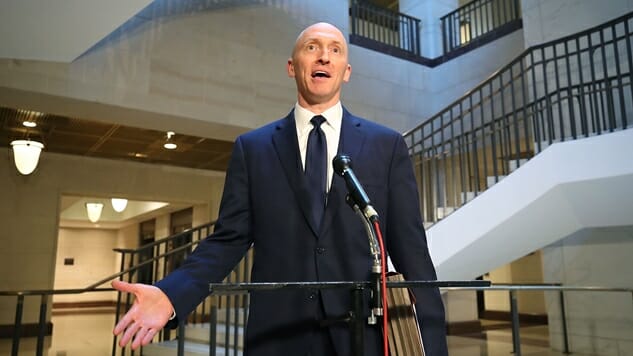Here’s What You Need to Know About the Extraordinary Carter Page FISA Applications
Photo by Mark Wilson/Getty
On Saturday night, something unprecedented happened: 412 pages of FISA applications were released to the public for the first time in history. The United States Foreign Intelligence Surveillance Court was established in 1978, and it is perhaps the most secretive court in the world. It was created to oversee requests for surveillance warrants against alleged foreign spies inside the United States, and the NSA and FBI submit the vast majority of these applications. Because the information underlying the application is so secretive, very little is publicly known about how FISA really works.
If you’re wondering how we gained access to these applications, you can thank the Freedom of Information Act. In a normal political world, we would never have the opportunity to see these documents, but the clown car of madness piloted by Devin Nunes and his lackeys in the House of Representatives revealed enough about these Carter Page FISA applications to the public that lawyer Mark Zaid, journalist Brad Heath and the James Madison Project were able to successfully convince a judge that enough information about the most secretive court in America was already revealed by our (Republican) public representatives, that the public had a right to see the rest of the redacted document.
You should be skeptical of the vast majority of folks acting like they know what they’re talking about from a legal perspective on these applications. To say that this is arcane law is an understatement. Not to mention, it’s heavily redacted, so it’s impossible to evaluate any overall narrative coming out of it. That said, there is enough information available where some arguments from team Trump can be wholly repudiated (like the supposed Democratic witch hunt—four Republican judges approved these FISA applications). This is where I will cede my time to folks who actually understand this court and can explain it in a cogent, non-partisan manner.
First up, the former head of intelligence law at the NSA, April Doss.
First, Title I only permits surveillance of a U.S. person when there’s probable cause to believe that the person is an agent of a foreign power. What the FBI put together in its submission was proof of PC. Remember, PC is not the same as proof beyond a reasonable doubt. 4/
— April Doss (@AprilFDoss) July 23, 2018
And that’s exactly what the 412 pages of these applications (initial and 3 renewals) did. They laid out a detailed case before a judge explaining why there was preliminary and ongoing cause to believe there was enough evidence for the government to continue investigating. 6/
— April Doss (@AprilFDoss) July 23, 2018
So the idea that DoJ, FBI, or FISC didn’t know there could be bias in the info is factually inaccurate. And the idea they wouldn’t’ve been able to assess the reliability of the info is: a) not true, and b) a red herring to detract from important facts showing probable cause. 8/
— April Doss (@AprilFDoss) July 23, 2018
One of the most damaging, demoralizing, and dangerous impacts of the rhetoric around the Russia investigation has been the politicization of intelligence. Folks, national security is a nonpartisan issue. Intelligence officers do their work in an honorable, nonpartisan way. 10/